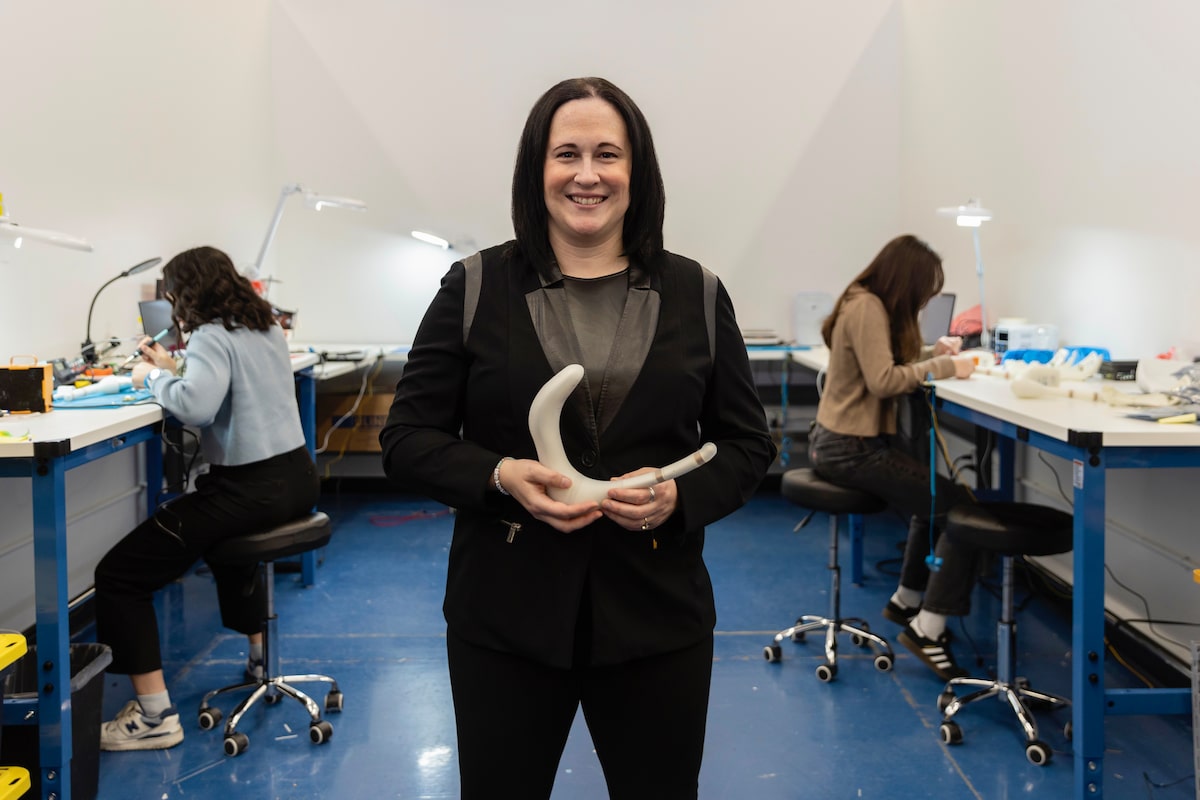Home » How femtech companies are tackling gender health gaps while empowering women
How femtech companies are tackling gender health gaps while empowering women

Not many people decide to pursue a business idea while undergoing cancer treatment, but Rachel Bartholomew was determined to address the gender health gaps she uncovered firsthand.
After being diagnosed with cervical cancer in 2019, Ms. Bartholomew discovered that women were still using devices called dilators that were first designed in 1938 for pelvic floor rehabilitation. (This kind of rehab can treat issues including incontinence, pain during intercourse and organ prolapse after pelvic disease diagnosis.) She also learned how little information there was on women’s pelvic disease and other health conditions affecting female bodies.

“I was handed this 84-year-old standard of care that is handed out in all of our cancer centres across Canada,” Ms. Bartholomew says. “So I was like, ‘Okay, somebody’s got to do something about this.’”
Ms. Bartholomew founded Hyivy Health, a Kitchener, Ont.-based femtech company whose first product is a Bluetooth-connected device called “Floora” for women with pelvic floor conditions. The device, which can be used at home, is a multitherapy wand that incorporates auto dilation, thermal therapy, biosensors and a mobile app where patients can track their progress and interact in real time with their therapist. (The device is currently in clinical trials.)
In going through the fundraising process with her new startup, Ms. Bartholomew encountered challenges as a female innovator.
“I was very much going through the struggles of, ‘How do I pitch something for a vagina to a roomful of men?’” says Ms. Bartholomew. “There’s a lot of education and external validation they need to even consider this an issue, partially because we’re pitching to the wrong gender.”
Overcoming systemic barriers
While Ms. Bartholomew was able to raise multiple rounds of investments, it was difficult, and she was motivated to connect with like-minded companies and help them get to the next stage.
She founded Femtech Canada, a women’s health network initiative aiming to provide women innovators with resources, networking and business advisory support. The organization is backed by an advisory board of venture capital members and runs with the support of not-for-profit business accelerator Innovation Factory.
Femtech is a tech sector with products, services and resources tailored toward health concerns that solely or disproportionately impact women, girls, non-binary and trans folks and those assigned female at birth. There are more than 120 startups and scale-ups in the Femtech Canada community addressing health concerns such as menopause, menstruation, sexual health, mental health and more.
Ms. Bartholomew says that she hopes that through this network, the organization can raise awareness about the systematic issues femtech companies, and women in general, face today.
“[The problem is] rooted in the way we teach our doctors, the way we teach sexual health to young children,” she says. “[There are] so many things that make it really tough to move that needle.”
Marina Adshade, assistant professor of teaching at the Vancouver School of Economics, points out that because women were historically excluded from medical research, we have ended up with health-care solutions by men for men.
“Ignoring women’s health comes at a real cost because women make enormous contributions to the society in which we live,” she adds. “The biggest return to the economy would be investing in women’s health.”
According to a 2024 report from McKinsey & Company, investments addressing the women’s health gap could potentially boost the global economy by $1-trillion annually by 2040.
Flagged as ‘inappropriate content’ – The challenges of building a femtech company
Nadia Ladak, co-founder and CEO of Toronto-based Marlow, a startup that produces a lubricated tampon product, says that it takes a lot of education for consumers and investors to understand why there is a problem and how their products can benefit them.
It can be a challenging process, she says. When marketing Marlow products, Meta and Instagram would often flag their posts as “inappropriate content.”
Ms. Ladak says that growing up as a swimmer, tampons were necessary but always uncomfortable. She went to a doctor to find a solution and was told to “spit on the tampon” to make it easier – which gave Ms. Ladak and her three co-founders the idea to develop the product during a university entrepreneurship course.
Kiara Botha, co-founder and CMO of Marlow, highlights that women are often socialized to put up with pain instead of demanding products that work toward solutions.
“It’s normalized, instead of questioning things, starting conversations, having more innovation and products,” she says.
She adds that one of the biggest themes they see coming in online about their products is that people finally feel seen and heard.
“A lot of the comments are, ‘I thought I was the only one that experienced this, that there was something wrong with me.’”
Calling out taboos
Annie Thériault, managing partner of Toronto-based Cross-Border Impact Ventures, says she began investing in health technology because she wanted to find an overlap where her company could earn venture capital returns but also achieve big impact goals. She was keen on women’s health specifically because of how underfunded it has been historically.
When asked if she was worried about taboos that might come with investing in certain products, she says, “We live in a taboo.”
For Ms. Thériault, “The best way to deal with [these topics], at least for us as a firm, is to just call it out.”
Dallas Barnes is founder and CEO of Reya Health, an app that helps individuals pick their birth control. She says she’s met a lot of male investors who don’t understand the space, who will ask questions like: Why is this even a problem? Isn’t this a niche market?
“We always have to say, ‘This is 50 per cent of the population who’s experiencing it.’ This is not a niche problem,” says Ms. Barnes, who is also an adviser with Femtech Canada.
Ms. Barnes started Reya after years spent trying different birth control options and two hospitalizations from bad reactions during the process. She did extensive research to find the right option for her.
“That experience of becoming an expert was just so validating, that I could acquire knowledge, apply it to my life, and then it turned out to be a successful health decision,” she says.
She notes that many femtech company founders get into the space because of their own challenging experiences in the health-care system, determined to share with others what they’ve learned.
“It’s been the most rewarding to help people take ownership of their own health and be their own advocate, so that they can feel empowered too.”
Related news
Innovation Factory
Innovation Factory is a business accelerator, dedicated to helping Ontario-based businesses launch, scale, and succeed. We provide start-ups, and scaling companies with advisory services, training, mentorship, and strategic connections to help bring disruptive technologies to market, leverage intellectual property, increase revenues, attract investment and create jobs. Serving as the catalyst for tech innovation in the greater Hamilton area since 2011 we are driven to help: Entrepreneurs bring new ideas to life and to market Small/Medium Enterprises (SMEs) get to the next level Hamilton build a dynamic culture and a community of innovation Innovation can happen anywhere. Our goal is to make it work everywhere. We work to elevate key industry sectors including, advanced manufacturing, clean tech, information technology, integrated mobility, life sciences & health care and social innovations.

